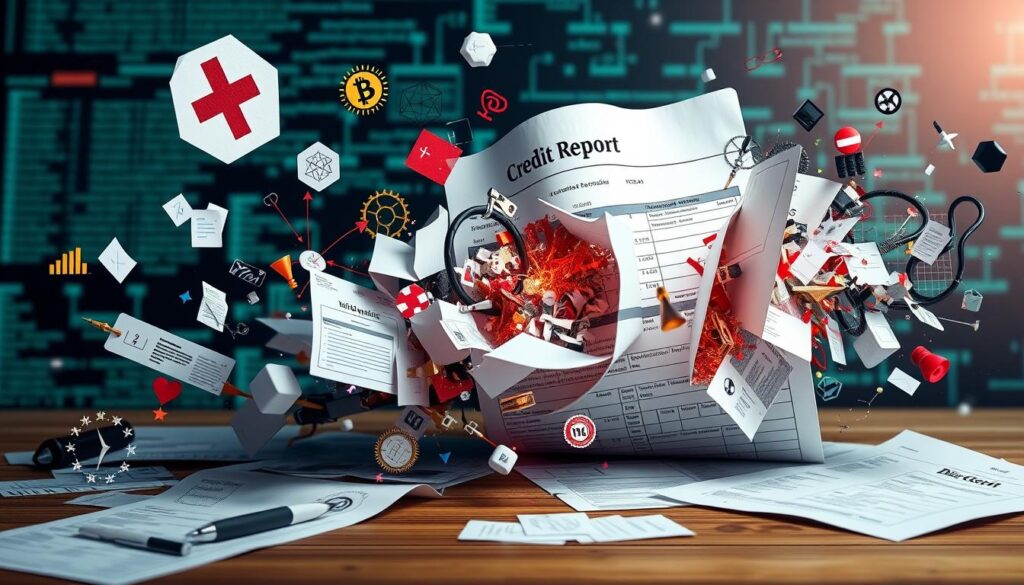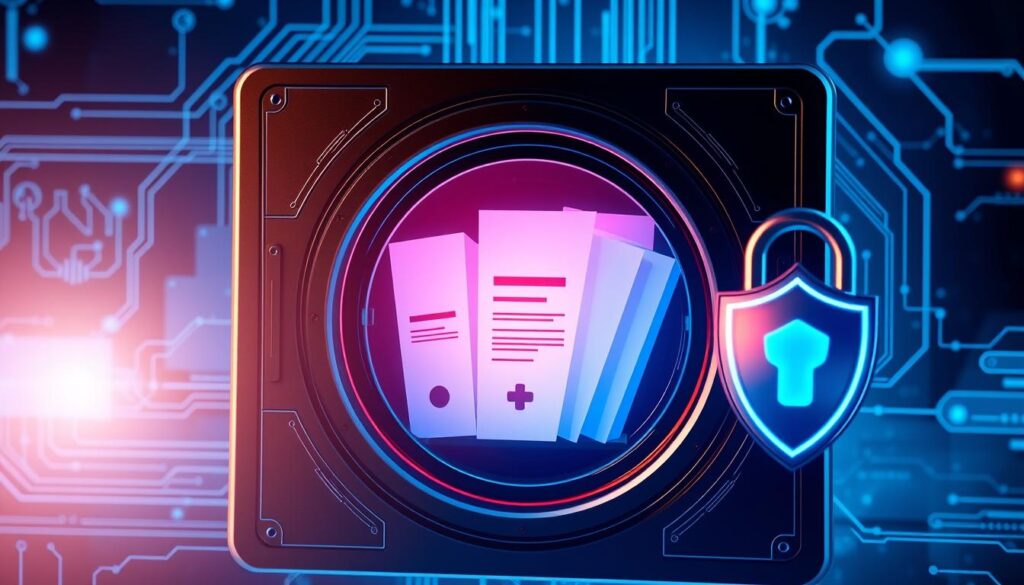Medical debt can be overwhelming, but you can remove collections from your credit report while following HIPAA rules. This guide will help you understand your rights and dispute unfair medical debt. You’ll learn how to rebuild your credit after resolving these financial issues.
We’ll cover strategies for identifying billing errors and accessing financial assistance programs. You’ll also discover how to use patient advocate resources effectively. Finally, we’ll explore debt consolidation options and ways to prevent future medical bill problems.
Key Takeaways
- Understand the impact of medical debt on your credit score and how HIPAA protects patient privacy
- Learn the process of disputing medical collections with credit bureaus and negotiating with healthcare providers
- Discover strategies for identifying billing errors, accessing financial assistance programs, and leveraging patient advocate resources
- Explore debt consolidation and settlement options, as well as preventive measures for future medical bills
- Develop a plan to rebuild your credit and financial stability after removing medical collections
Understanding Medical Collections and HIPAA
Medical collections can be complex and overwhelming. They can impact your credit score and financial health. HIPAA protects your patient privacy during this process.
The Impact of Medical Debt on Credit Scores
Medical debt can significantly harm your credit score. Unpaid bills often go to collections, staying on your credit report for seven years. This can make getting credit, loans, or rental agreements difficult.
Addressing medical debt quickly is crucial. It helps minimize long-term effects on your credit score. Prioritize settling these debts to protect your financial future.
HIPAA: An Overview of Patient Privacy Laws
HIPAA is a federal law protecting your medical information. It ensures healthcare providers and insurers handle your data carefully. This law shields you from unauthorized access or disclosure.
Understanding HIPAA rights is vital. It helps you navigate medical collections while maintaining patient privacy. Knowing these rights empowers you during the process.
| Key HIPAA Provisions | What They Mean for Patients |
|---|---|
| Confidentiality | Healthcare providers and insurers must keep your medical information confidential and secure. |
| Access to Records | You have the right to access and obtain copies of your own medical records. |
| Consent for Disclosure | Your healthcare providers must obtain your consent before sharing your medical information with third parties. |
Knowledge is power in medical collections. Understanding debt’s impact and HIPAA protections helps you manage collections effectively. These insights safeguard your financial well-being and privacy.
Disputing Medical Collections with Credit Bureaus
Medical collections on your credit report can be frustrating. You can dispute these negative items to potentially remove them. This process involves working with credit bureaus to challenge the accuracy of medical collections.
First, get copies of your credit reports from Experian, Equifax, and TransUnion. Review each report for inaccurate or duplicated medical collections. Then, start the credit report disputes process.
- Gather supporting documentation: Collect evidence like medical bills, insurance statements, or healthcare provider correspondence.
- File a dispute with the credit bureaus: Write a letter or use their online process. Explain why the item is inaccurate or should be removed.
- Provide the necessary documentation: Include your gathered documents to support your dispute.
- Follow up and monitor the progress: Credit bureaus have a timeframe to investigate. Check in if you don’t hear back.
These steps can help remove medical collections from your credit report. They can also resolve credit bureau disputes. Stay persistent and pay attention to details.
Improving your credit report disputes process can boost your financial health. It may also increase your credit scores.

“Removing medical collections from your credit report can be a significant step towards improving your financial well-being and credit scores.”
| Action | Benefit |
|---|---|
| Disputing medical collections with credit bureaus | Potentially removing inaccurate or unwarranted negative items from your credit report |
| Providing supporting documentation | Strengthening your case and increasing the likelihood of a successful dispute |
| Monitoring the dispute process | Ensuring timely resolution and follow-up on the credit bureau’s investigation |
Negotiating with Healthcare Providers
Proactively negotiate with your healthcare providers when facing medical collections. This can help identify and resolve billing errors or overcharges. You can often reach a mutually agreeable resolution through collaboration.
Identifying Billing Errors and Overcharges
Review your itemized bills and explanations carefully. Look for discrepancies, duplicate charges, or services you didn’t receive. Keep detailed records to build a strong case for correcting medical billing errors.
Requesting Itemized Bills and Explanations
Ask your healthcare provider for detailed, itemized bills if you don’t have them. These bills offer insight into specific charges and services. Request clear explanations for each line item to understand charges and spot potential overcharges.
Working with your healthcare providers can help you manage medical debt more effectively. This approach is crucial in healthcare provider negotiation and can improve your financial well-being.
remove medical collections hipaa
HIPAA is crucial for managing medical debt and credit report issues. This patient privacy law protects your information and helps address remove medical collections hipaa. It ensures your rights are upheld.
HIPAA allows you to request removal of inaccurate medical collections from your credit report. You can dispute wrong entries using your hipaa compliance rights. This compels healthcare providers and credit bureaus to fix the issue.
To use HIPAA for patient rights and credit report cleanup, follow these steps:
- Obtain your medical records and billing statements to identify discrepancies or errors.
- Submit a written request to the healthcare provider to remove inaccurate medical collections.
- File a complaint with HHS if the provider doesn’t comply.
- Follow up with credit bureaus, providing evidence of the HIPAA violation.
Taking action and asserting your hipaa compliance rights helps navigate medical debt complexities. This ensures your credit report accurately reflects your financial situation.

Remove medical collections hipaa protects your financial future and medical privacy. With knowledge and persistence, you can overcome medical debt challenges. This helps maintain a credit profile that truly represents your financial health.
The Role of Patient Advocates and Ombudsmen
Patient advocates and ombudsmen are crucial in medical collections and HIPAA compliance. They help with billing disputes, rights protection, and connecting people to support services. These experts can be a game-changer in resolving complex healthcare issues.
Leveraging External Support Resources
Patient advocates and ombudsmen can connect you with valuable external support resources. These can help remove medical collections from your credit report. They know where to find the right help for your situation.
- Legal aid clinics and pro bono attorneys who can provide guidance on HIPAA violations and credit reporting disputes
- Financial counseling services that can help you negotiate payment plans or access financial assistance programs
- Community-based organizations that offer educational resources and support groups for individuals dealing with medical debt
These professionals have a wide network of resources at their fingertips. They can guide you through the complex process of removing medical collections. Their expertise can lead to a better outcome for you.
| Resource | Description | Contact Information |
|---|---|---|
| Patient Advocate Foundation | Nonprofit organization that provides free mediation and arbitration services to patients facing insurance, access to care, and job retention issues. | Phone: 1-800-532-5274 Website: patientadvocate.org |
| National Association of Healthcare Advocacy Consultants | Professional association that connects individuals with experienced and vetted healthcare advocates. | Phone: 1-877-868-2229 Website: nahac.com |
| Consumer Financial Protection Bureau | Government agency that provides guidance and assistance in resolving issues with credit reporting, debt collection, and financial services. | Phone: 1-855-411-2372 Website: consumerfinance.gov |
Patient advocates and ombudsmen are your allies in healthcare challenges. They help you navigate medical collections and HIPAA compliance confidently. With their support, you can protect your rights and financial well-being effectively.
Fair Credit Reporting Act Protections
The Fair Credit Reporting Act (FCRA) gives you specific rights about medical collections on your credit report. This federal law protects the accuracy, fairness, and privacy of your credit information.
Under the FCRA, credit bureaus must investigate disputes about credit information accuracy, including medical collections. If you think a medical debt is reported wrongly, you can start a dispute process.
Credit bureaus must verify information from healthcare providers or collection agencies before adding it to your report. This ensures your credit report accurately shows your financial history.
The FCRA also covers reporting of paid or settled medical debt. Credit bureaus must remove these collections within 45 days of being notified.
“The Fair Credit Reporting Act is a crucial piece of legislation that empowers consumers to maintain the integrity of their credit reports and safeguard their financial well-being.”
Knowing your FCRA rights helps you protect your credit report. You can take steps to ensure it correctly shows your medical debt history. This safeguards your fair credit report protections as a consumer.
| Key FCRA Protections for Medical Debt | Description |
|---|---|
| Dispute Process | The right to dispute inaccurate medical debt information on your credit report. |
| Verification of Accuracy | Credit bureaus must verify the accuracy of medical debt information before including it in your credit report. |
| Paid/Settled Debt Removal | Credit bureaus must remove paid or settled medical collections within 45 days of notification. |
Debt Consolidation and Settlement Options
Medical debt can be overwhelming, but solutions exist. Debt consolidation combines multiple debts into one manageable payment. This simplifies repayment and may lower your overall interest rate.
Debt settlement involves negotiating with creditors to reduce the amount owed. It can lead to a lower, lump-sum payment for significant medical collections. However, carefully consider its long-term effects on your credit score.
Evaluating Financial Assistance Programs
Many healthcare providers and financial institutions offer financial assistance programs. These may include payment plans, reduced-cost care, or debt forgiveness. Explore these options to see if you qualify for relief.
- Research local and national financial assistance programs that may be available to you
- Speak with your healthcare provider or a patient advocate about potential debt consolidation and settlement options
- Carefully consider the long-term implications of any debt management strategy on your credit score and financial stability
By exploring these alternatives, you can address your medical collections effectively. Take proactive steps to regain control over your financial well-being.
Preventive Measures for Future Medical Bills
Managing healthcare expenses can prevent future medical collections on your credit report. Understanding billing practices and taking strategic steps reduces unexpected or erroneous medical bills. Let’s explore effective ways to manage your medical bills.
Understand Your Health Insurance Coverage
Know your health insurance plan details. This includes deductibles, copays, and coverage limits. Understanding these helps you plan for potential out-of-pocket costs.
Communicate with Healthcare Providers
Talk openly with your healthcare providers. Ask about their billing procedures, request itemized bills, and clarify any charges you don’t understand. This helps identify and address issues early.
Maintain Detailed Records
Keep meticulous records of your medical bills and payments. Document all interactions with healthcare providers. This helps if you need to dispute charges or negotiate.
Utilize Preventive Healthcare
Prioritize regular check-ups and screenings. Good health maintenance can catch issues early. This may help avoid costly treatments and unexpected bills later.
| Preventive Measure | Benefits |
|---|---|
| Understanding Health Insurance Coverage | Anticipate out-of-pocket costs and plan accordingly |
| Communicating with Healthcare Providers | Identify and address potential billing issues |
| Maintaining Detailed Records | Facilitate dispute resolution and negotiation |
| Utilizing Preventive Healthcare | Avoid costly medical treatments and unexpected bills |
These steps help manage medical bills and reduce healthcare costs. They also lower the risk of future medical collections on your credit report.

Credit Repair Strategies After Removal
You’ve removed medical collections from your credit report. Now, focus on rebuilding your credit and financial stability. Use strategic tactics to improve your credit score and control your finances.
Rebuilding Credit and Financial Stability
Get your credit report from Experian, Equifax, and TransUnion. Check if medical collections are gone and look for other errors. If you find issues, dispute them with the credit bureaus.
Build positive credit history by using credit cards wisely. Pay all bills on time. Consider a secured credit card or become an authorized user on someone’s account.
Make timely payments and keep credit card balances low. This will gradually boost your credit score over time.
Create a budget that matches your income and expenses. Save money regularly. Look into debt consolidation or payment plans for any remaining debts.
Use financial assistance programs or debt management services if needed. These steps will help you regain financial stability and protect your credit future.

